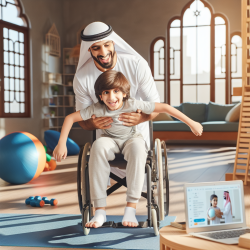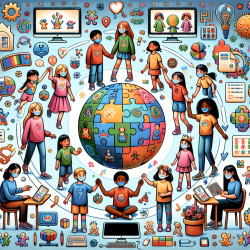The involvement of fathers in the rehabilitation of children with disabilities is a crucial yet under-researched area, particularly in the context of the United Arab Emirates (UAE). A recent study titled "Nationwide study of fathers’ involvement in the rehabilitation of children with disabilities in the United Arab Emirates" sheds light on this significant topic. This blog aims to help practitioners improve their skills by implementing the outcomes of this research or encouraging them to conduct further research.
Understanding Fathers' Involvement
The study involved 1027 parents (469 fathers and 558 mothers) who completed the revised Fathers’ Involvement in Development and Rehabilitation Scale. The scale measures three key areas: support, attitudes, and participation in training. The findings revealed that fathers in the UAE rated themselves highly on attitudes and support towards their children with disabilities compared to mothers.
Key Findings
- Fathers' mean scores were higher in support and attitudes towards their children with disabilities.
- Parental type (fathers vs mothers) significantly moderated the relationship between the support needs of children and paternal support.
- There was a significant relationship between support, participation in training, and attitudes towards children with disabilities.
Implications for Practitioners
The findings suggest that fathers play a crucial role in the development and rehabilitation of children with disabilities. Here are some practical steps for practitioners:
1. Encourage Fathers' Participation
Given the high involvement of fathers in the UAE, practitioners should actively encourage fathers to participate in rehabilitation programs. This can be done through:
- Organizing workshops specifically for fathers.
- Creating father-friendly environments in rehabilitation centers.
2. Focus on Attitude Improvement
Since attitudes significantly impact the support provided, practitioners should:
- Conduct sessions that address stereotypes and negative attitudes towards disabilities.
- Promote positive interactions between fathers and their children.
3. Provide Training Opportunities
Participation in training programs was found to be a significant factor. Therefore, practitioners should:
- Offer regular training sessions on effective caregiving techniques.
- Ensure that training materials are accessible and relevant to fathers.
Encouraging Further Research
While this study provides valuable insights, more research is needed to understand the nuances of fathers' involvement. Practitioners and researchers should:
- Conduct longitudinal studies to track the impact of fathers' involvement over time.
- Explore the challenges fathers face and develop strategies to address them.
To read the original research paper, please follow this link:
Nationwide study of fathers’ involvement in the rehabilitation of children with disabilities in the United Arab Emirates.










